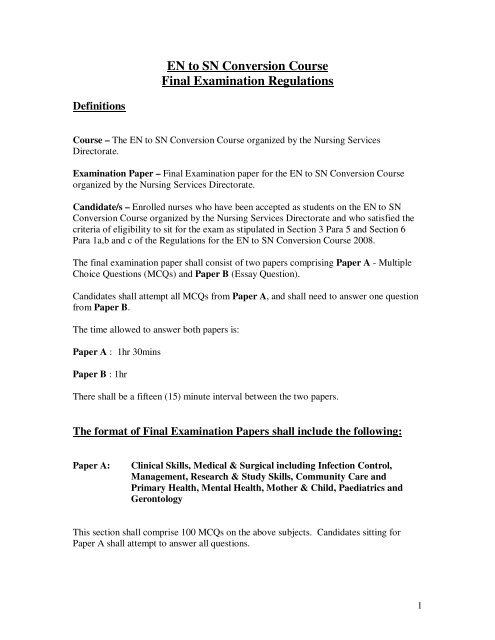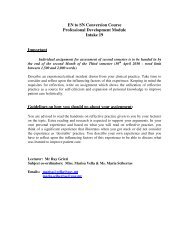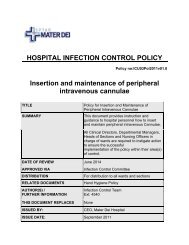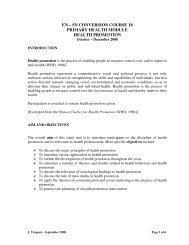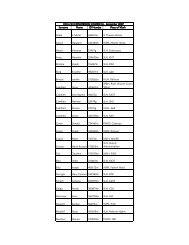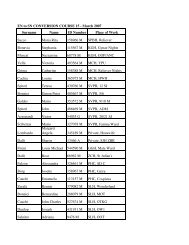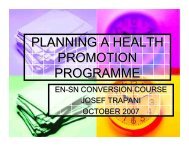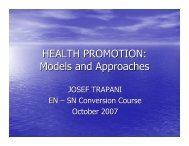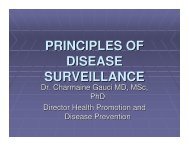Final Exam Regulations - Continuous Professional Development
Final Exam Regulations - Continuous Professional Development
Final Exam Regulations - Continuous Professional Development
You also want an ePaper? Increase the reach of your titles
YUMPU automatically turns print PDFs into web optimized ePapers that Google loves.
Definitions<br />
EN to SN Conversion Course<br />
<strong>Final</strong> <strong>Exam</strong>ination <strong>Regulations</strong><br />
Course – The EN to SN Conversion Course organized by the Nursing Services<br />
Directorate.<br />
<strong>Exam</strong>ination Paper – <strong>Final</strong> <strong>Exam</strong>ination paper for the EN to SN Conversion Course<br />
organized by the Nursing Services Directorate.<br />
Candidate/s – Enrolled nurses who have been accepted as students on the EN to SN<br />
Conversion Course organized by the Nursing Services Directorate and who satisfied the<br />
criteria of eligibility to sit for the exam as stipulated in Section 3 Para 5 and Section 6<br />
Para 1a,b and c of the <strong>Regulations</strong> for the EN to SN Conversion Course 2008.<br />
The final examination paper shall consist of two papers comprising Paper A - Multiple<br />
Choice Questions (MCQs) and Paper B (Essay Question).<br />
Candidates shall attempt all MCQs from Paper A, and shall need to answer one question<br />
from Paper B.<br />
The time allowed to answer both papers is:<br />
Paper A : 1hr 30mins<br />
Paper B : 1hr<br />
There shall be a fifteen (15) minute interval between the two papers.<br />
The format of <strong>Final</strong> <strong>Exam</strong>ination Papers shall include the following:<br />
Paper A: Clinical Skills, Medical & Surgical including Infection Control,<br />
Management, Research & Study Skills, Community Care and<br />
Primary Health, Mental Health, Mother & Child, Paediatrics and<br />
Gerontology<br />
This section shall comprise 100 MCQs on the above subjects. Candidates sitting for<br />
Paper A shall attempt to answer all questions.<br />
1
Marking Scheme:<br />
For every correct answer the candidate shall gain one mark.<br />
For every wrong answer the candidate shall gain zero or no mark, but for every four<br />
attempted wrong answers the candidate shall be deducted one mark.<br />
For every un-attempted question the candidate shall gain no marks.<br />
The total marks for Paper A will be of hundred (100) marks and the pass mark is fifty<br />
(50) percent, that is, 50 marks.<br />
Paper B: <strong>Professional</strong> <strong>Development</strong> including Ethics<br />
This section shall comprise two questions focused on this module and candidates shall<br />
have to choose and answer one question from this paper. The rating for this section shall<br />
be of hundred (100) marks and the pass mark is forty five (45) percent (45 marks).<br />
Candidates shall need to obtain a pass mark from both papers as indicated above, in<br />
order to pass the whole examination, hence there shall be no compensation of marks<br />
from one paper to the other.<br />
<strong>Exam</strong>ination Procedure<br />
Candidates shall be allocated an examination number for the purpose of anonymity.<br />
However ‘Slip A’ on each answer book and on the MCQs booklet shall include the<br />
candidates’ name and surname and Identity Number.<br />
At the end of the examination all booklets shall be collected by the invigilator/s and<br />
handed to the FHS secretarial staff. In turn, the secretarial staff confidentially shall<br />
allocate an examination number on ‘Slip A’ and ‘Slip B’ for each candidate. ‘Slip A’<br />
shall then be separated from each and every booklet, put in a sealed envelop and put in<br />
the ‘safe’. The booklets shall then be distributed to the corresponding markers for<br />
marking. Hence the markers shall never be in a position to identify any of the candidates<br />
as ‘slip A’ is detached from the booklets.<br />
<strong>Exam</strong>ination Dates<br />
Candidates initiating their course in the month of March shall sit for their final<br />
examination by the third week of June of the following year.<br />
2
Candidates initiating their course in the month of September shall sit for their final<br />
examination by the third week of January of the second year after the initiation of the<br />
course.<br />
Attendance<br />
The announcement of the final examination date, time, and venue shall be at least three<br />
weeks before the actual date of examination.<br />
Candidates shall be seated at least fifteen minutes before the start of the first examination<br />
paper to allow time for the initial paperwork. The invigilator/s shall then distribute the<br />
first examination paper (Paper A) face down to each student. The examination paper shall<br />
then be read by the course co-ordinator (or his/her representative), after which the<br />
candidates shall be allowed to start the exam.<br />
When the pre-set time for the first paper elapses, the booklets shall be gathered by the<br />
invigilator/s and a fifteen (15) minute interval shall be granted before candidates continue<br />
for Paper B. Paper B shall then be distributed and candidates shall start answering the<br />
questions when given the go ahead by the invigilator/s.<br />
Candidates who call more than 15 minutes late for each part of the examination shall not<br />
be allowed to sit for that part of the examination.<br />
Candidates shall not be allowed to leave the examination room during the first 15 minutes<br />
from the initiation of each part of the examination. This can be over ruled only in the case<br />
of sickness during the actual examination.<br />
Candidates finishing each exam paper before the stipulated time shall be allowed to leave<br />
the examination room only if they hand in all the examination booklets to the<br />
invigilator/s. Once outside the examination room, candidates shall not be allowed back<br />
in.<br />
Candidates who report sick on the day of the examination shall need to submit a sick<br />
leave certificate by not later than three days after the actual examination date.<br />
Candidates not sitting for the examination without a valid reason as stated above shall be<br />
considered failed.<br />
Re-sits<br />
Candidates who fail from any part of the examination shall be given the chance to re-sit<br />
the failed paper/s with the final examination candidates of the next scheduled course<br />
group.<br />
3
Candidates failing from one paper only shall be allowed to re-sit as indicated above for<br />
that failed paper only.<br />
Candidates shall be allowed three (3) attempts should they fail from the final<br />
comprehensive examinations.<br />
Invigilation<br />
Invigilation shall be present throughout the whole examination. For this reason an<br />
invigilator/s shall be appointed and given the date of the examination.<br />
On the day of the examination the invigilator/s shall report half an hour before the<br />
examination and consult with the secretarial staff and course coordinator so that the<br />
sealed package containing the booklets and examination papers are checked. A special<br />
form shall also be included in the sealed package where the invigilator/s shall write the<br />
number of booklets found in the package, the number of booklets distributed and the<br />
number of booklets returned. The invigilator/s shall also monitor and write those who<br />
temporarily leave the examination room by noting the time they left and the time they<br />
returned and countersigned by the same candidate who left and returned.<br />
At the end of the examination the invigilator/s shall sign/s the monitoring form and<br />
return/s it, together with the booklets, to the secretarial staff.<br />
Candidates are requested to find a place in the examination room according to their<br />
planned allocations by the secretarial staff.<br />
Candidates are only allowed to keep in their possession writing utensils (ballpoints and<br />
pencils), calculators and watches. Other belongings brought by the candidates are to be<br />
kept near the invigilator/s. No mobile phones and/or pagers are allowed in the<br />
examination room. If such apparata are present they should be turned and kept ‘off’ and<br />
put near the invigilator/s.<br />
No form of correcting material is allowed in the examination hall.<br />
Invigilators shall have the right to temporarily confiscate any apparata which they deem<br />
are not allowable in the examination room.<br />
Invigilators shall have the right to report candidates who are caught copying from other<br />
candidates or from material caught in their (candidates’) possession.<br />
Invigilators shall have the right to dismiss and expel candidates out of the examination<br />
room if caught misbehaving in a manner of distracting other candidates sitting for the<br />
examination.<br />
4
MCQs<br />
While attempting the multiple choice questions candidates may realize that the answer<br />
they ticked was not correct. In such circumstances candidates should clearly draw a<br />
horizontal line running from outside one side of the marking box to the outside of the<br />
other side of the same marking box, then tick what they think was the right answer (See<br />
example below)<br />
Marking<br />
x<br />
x<br />
First attempted answer<br />
and corrected<br />
Second attempt<br />
After all the answered booklets are handed to the secretarial staff and processed as<br />
indicated above, they are distributed to their corresponding markers for marking. The<br />
markers shall assign a mark and write it on the front of the booklet in the space provided.<br />
Any comments by the markers shall be written and endorsed in blue or black ink either<br />
within the margins or at the end of the answer.<br />
As for the MCQs, the answers shall be checked against a prepared coded sheet containing<br />
the correct answers by two separate competent individuals and cross checked<br />
accordingly.<br />
Markers (double marking)<br />
Double marking is only indicated in borderline cases of Paper B or when the <strong>Exam</strong>ination<br />
Board deems necessary.<br />
Benchmarking<br />
A benchmark shall be set after the examination event and markings have been processed<br />
(together with the continuous assessment marks achieved during the whole course) by the<br />
examination board.<br />
5
<strong>Exam</strong>ination Board<br />
The <strong>Exam</strong>ination Board shall be responsible for preparing and setting the final<br />
examination paper after collecting enough questions from the subject coordinators.<br />
The Board of <strong>Exam</strong>ination shall be composed of the same individuals who submit the<br />
exam questions, that is, the subject coordinators, plus an external examiner and an<br />
observer who shall supervise and audit the process.<br />
The <strong>Exam</strong>ination Board shall be responsible for scrutinizing and monitoring the actual<br />
examination process.<br />
The markers shall be the subject coordinators.<br />
There shall be a second marking strategy for borderline results only.<br />
The Board of <strong>Exam</strong>iners shall moderate not only the borderline candidates but shall also<br />
randomly pick other answer books as samples for moderation.<br />
6


